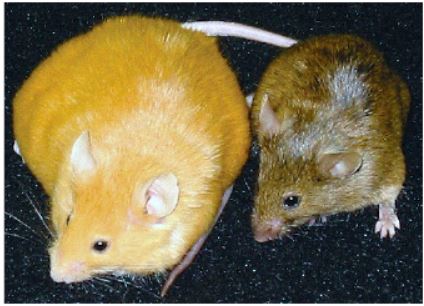Do you really want to know what your genes tell us?
One of my clients said she didn't want to know about her genes. This is true for many people because
they think that if there is a "bad" gene there is nothing they can do about it. This is not exactly true.
Dr. Sungchui Ji, Rutgers University gave a presentation for the "Interpreting Your Genetics" Summit
and used music to explain genetics.

Music has two parts:
- Sheet music to read
- Audio music we hear
Genes have two parts:
- Genotype which is like sheet music (it has the instructions)
- Phenotype which is what we display
The 2 mice have the exact same genes (genotype - sheet music), but look quite different (phenotype - music we hear/what we see).
Since many people, including me, can't read sheet music, we need someone to read it for us and create
a sound that we enjoy. The music can sound good or bad depending on the environment where it is being
played, for example, a noisy bar or music hall.
For genes, the musician is the cell. If the cell has a SNP (see below), it is sensitive to changes in the
environment. The cell won't function well if the environment is bad and may need certain food/supplements
to help it adapt or foods/supplements it needs to avoid.
For example, some people have SNP's that don't break down caffeine very well and can't drink
coffee in the afternoon or will stay up all night. Or some people will react badly to milk thistle,
although it is known to help the liver detox.
What is a SNP?
A SNP is a Single Nucleotide Polymorphism that is associated with an "rs" number. Think of DNA as a
ladder and the rs number a rung on the ladder. When the DNA divides, the rungs will match up with
amino acids from the foods we eat to provide energy, neurotransmitters for our brains, etc. When the
amino acid sequence doesn't line up correctly on the ladder, it will jiggle around to fit into an area where
it is supposed to work.
The SNP will be either (+/+) if it lines up correctly, (-/+) or (-/-) if not. A (-/+) SNP will slow the cell
down approximately 30%. A (-/-) SNP can slow a process down by 60%.
Genetics, Genomics, and Nutrigenomics
Nutrigenomics can heal people and get people off of their prescription medications by manipulating
their DNA with nutritional food and supplementation." Sterling Hill, MTHFRSupport.com



